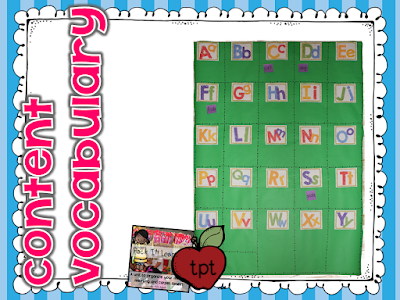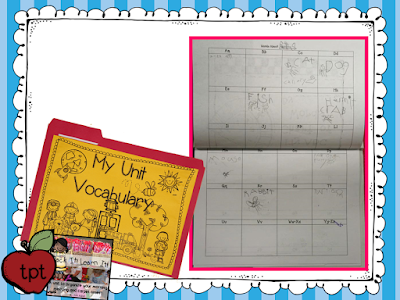Academic Vocabulary
First, lets look at Academic Vocabulary. Academic Vocabulary are the words that are necessary for children to understand content specific questions and discussions. For example, if I said, "How many syllables are in this words?" and the children didn't know the word syllable, than they wouldn't be able to answer the question even if they knew how to "clap out" word parts. Robert Marzano is the expert with Academic Vocabulary. Our school, kindergarten through fifth grade, uses his plan. But, when we looked at the methodology, we made a few minor adjustments for our kinders.
Here are the steps we took:
- First, we looked at our standards. We made a list of ALL of the academic words that the children need to know in order to master the standards.
- Then, we made word cards for every word with a picture clue.
- We sorted the words into weekly sets according to the weeks we were INTRODUCING the standard. Each week, we add these new words to the Math Word Wall as we introduce the standard. We do the same for our Literacy Word Wall.
- This means that some weeks, 3-5 words could be added while other weeks no new words could be added.
- Each week we pick one literacy word and one math word. These are words that have been on the word wall for several weeks. The children have already been instructed in the standards that use these vocabulary words.
- We want to take these words to a deeper level of understanding. We are not going to do this for every word on the word wall, just the most important words.
- When deciding the MOST important words, ask yourself, which words do they need to know to be successful in first grade. Which words do they need to have such a deep understanding that they can use them in conversation, discussions, and to answer questions?
- Marzano tells us that children need to have a linguistic and a nonlinguistic representation of the word. This means that they need to be able to draw a picture to show their understanding of the word, and they need to be able to generate a definition--not memorize one!
- A teacher asked, "What if they can't draw?" Don't worry about YOU being able to tell what they have drawn. If they tell you "this is a _____.", then all is well!
- You may also want to put this activity in a center, the following week.
- To do this, provide the children with a recording page to write the word, draw a picture, and create a definition.
- Marzano also says children should rate their understanding of a word. I provided 3 faces for the children to use to indicate. Now I know that they don't really understand what they are doing here. But, since our kids are doing this in every grade, I want to set the stage for what's to come.
These resources are from this unit.
Content Vocabulary
Content Vocabulary words are referred to as Tier 3 Words. Ever set in a teacher meeting and just listened? I mean really listened. How many words do you hear that adults, who are not teachers, wouldn't understand? That's because these words are content specific to teachers! This is true of professions and hobbies! So why is this important for children...COMPREHENSION! If a child is asked to read a book about hibernation, but lacks the content vocabulary associated with that topic, their comprehension suffers. A child might be able to decode the words, but unless they have an understanding of the words, they can't use them to help understand the text. This is why science and social studies ARE important in kindergarten. It is through these that we develop the content vocabulary that is the topic for many nonfiction pieces of text.
Here's what we do:- Each week, once a week, we develop content vocabulary by using this abc graphic organizer.
- The first week, I ask the kids to tell me any words they know about our unit of study in science or social studies. These words are going to be words drawn from their schema. These are words they already know.
- I write these words on post it notes and stick them on the chart according to their beginning letter.
- The second and third weeks, we add more words to our chart. These will be words they have learned through our readings and activities.
- A teacher asked, "How long should you do a unit?" My first response is...as long as you can! First of all, this makes less work on you!
- Secondly, and most importantly, by extending a unit over 2-4 weeks, children are able to take their learning from the first week to a deeper level of understanding in weeks 2-4.
- Children are able to apply, create, and use many other higher order thinking skills.
- While I am writing the words, the children are busy creating their own Unit Vocabulary list.
- The children write the letters in the correct squares. I invite them to draw a simple picture to help them remember the word.
- Don't get caught up in handwriting. Even if the children are not writing the words correctly, they are learning the content vocabulary. They are also learning how to use a graphic organizer to organize information!
These resources are from this unit.



































1 comment:
Post a Comment